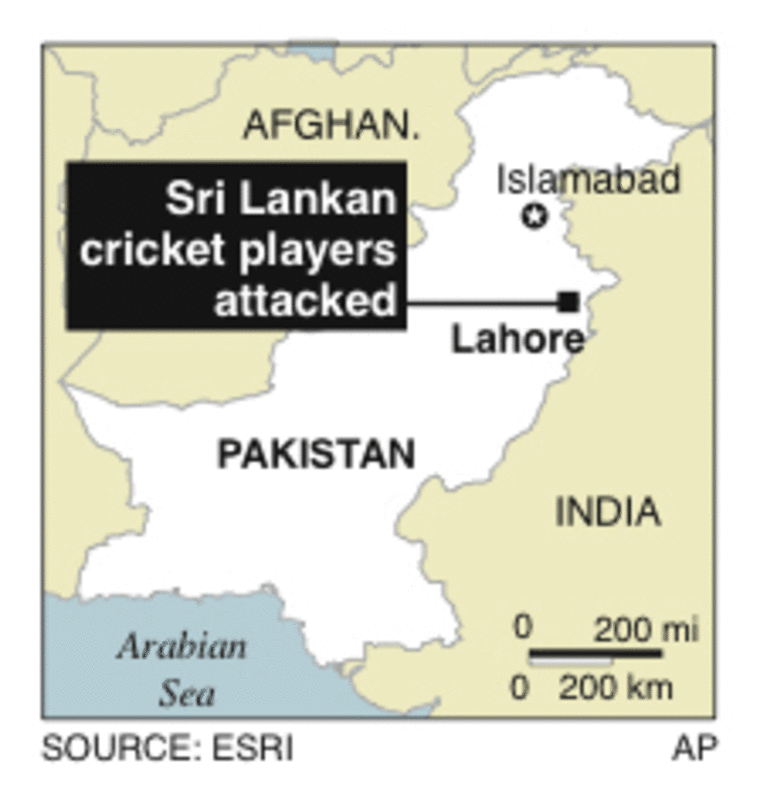Pakistani police said Wednesday they had detained some suspects in connection with the attack on Sri Lanka's cricket team that killed six police, wounded seven players and exposed the nuclear-armed country's inability to prevent terrorist attacks.
Senior police official Haji Habibur Rehman indicated that none of those detained during raids overnight were the gunmen in the highly coordinated assault, but that the suspects were being questioned in hopes of garnering leads.
"So far we have not made any headway toward the perpetrators," he told The Associated Press. He did not provide a specific number of people held.
Up to 14 heavily armed and well-trained gunmen sprayed the Sri Lankan bus with bullets and fired a rocket and a grenade as it traveled to a match against Pakistan in the eastern city of Lahore Tuesday. The bus sped through the ambush and reached the safety of the stadium.
"We were all tucked under the seats," Sri Lanka captain Mahela Jayawardene said when the team arrived home in Colombo early Wednesday. "Our guys were getting hurt and screaming but we couldn't help each other. We were just hoping that we will not get hit.
"None of us thought that we would come alive out of the situation."
Similar to Mumbai attacks
The assault bore many similarities to last year's three-day hostage drama in the Indian financial capital of Mumbai.
Working in pairs, the attackers in Lahore carried walkie-talkies and backpacks stuffed with water, dried fruit and other high-energy food — a sign they anticipated a protracted siege and may have been planning to take the players hostage, an official said.
None of the gunmen was killed and all apparently escaped into this teeming city after a 15-minute gunbattle with the convoy's security detail. In the hunt for the perpetrators, authorities found some bloodstained clothes at a nearby hostel, where some suspects were taken in, Rehman said.
President Asif Ali Zardari, who is battling rising criticism of his six-month rule and a brewing political crisis, said the attack showed "once again the evil we are confronting" in an opinion piece in the Wall Street Journal.
Pakistan's Punjab provincial government took out advertisements in newspapers Wednesday offering a $125,000 reward.
The ad showed two alleged attackers, one dressed in brown and the other blue, and both carrying backpacks and guns. The image was taken from TV footage of the event.
Besides the six police officers, a driver of a vehicle in the convoy was also killed, officials said. Seven Sri Lankan players, a Pakistani umpire and a coach from Britain were wounded, none with life-threatening injuries.
FBI chief in Islamabad
FBI Director Robert Mueller arrived in the capital Islamabad and was meeting with government officials on a trip arranged before Tuesday's attack, the U.S. Embassy said, giving no details.
By targeting a much-loved sport in Pakistan and elsewhere in South Asia, the gunmen were certain to draw international attention to the government's inability to provide basic security as it battles militants linked to al-Qaida and the Taliban and faces accusations it is soft on Islamist militants it once nurtured.
"The world has once again seen that Pakistan is an unsafe place, no matter where you are or who you are," wrote The News, a major daily, in its lead editorial.

The attack ended Pakistan's hopes of hosting international cricket teams — or any high profile sports events — for months, if not years. Even before Tuesday, most cricket squads chose not to tour the country for security reasons. India and Australia had canceled tours, and New Zealand announced Tuesday it was calling off its December tour.
The International Cricket Council said it would review Pakistan's status as co-host of the 2011 World Cup.
Authorities canceled the test match against Pakistan and a special flight carried the Sri Lanka team — including Thilan Samaraweera and Tharanga Paranavitana who had been hospitalized with bullet wounds — home, where the exhausted-looking players had an emotional private meeting with their families.
Players had 'natural instinct'
Captain Jayawardene said that growing up in Sri Lanka, which has seen scores of terrorist attacks related to a separatist insurgency in its northwest, meant the players had a "natural instinct" that made them immediately hit the floor at the first sound of gunfire.
"We are used to hearing, seeing these things. Firing, bombings. So we ducked under our seats when the firing began," Jayawardene told reporters.
Pakistan has a web of militant networks, some with links to al-Qaida and the Taliban, which have staged other high-profile strikes in a bid to destabilize the government and punish it for its support of the U.S.-led invasion of Afghanistan.
One group likely to fall under suspicion is Lashkar-e-Taiba, the network blamed for the Nov. 26-28 Mumbai attacks, in which 10 gunmen targeted luxury hotels, a Jewish center and other sites, killing 164 people.
The group has been targeted by Pakistani authorities since then, and its stronghold is in eastern Pakistan.